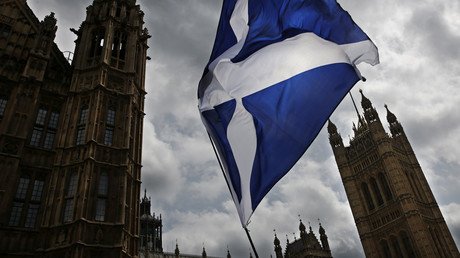Scotland needs to depart the sinking ship of Brexit

The Scottish National Party’s (SNP) spring conference in Aberdeen may well turn out to be the most important in the history of a party whose raison d’etre of independence and self-determination has never been more heightened, in the wake of Brexit.
Relations between the SNP-led devolved Scottish administration and the British government have never been more antagonistic, in the wake of the decision taken by a slim majority of voters across the UK last June to leave the EU. It is a decision that has plunged the UK into a full-blown political crisis, one that shows no sign of ending any time soon.
Just prior to the SNP’s conference, held between March 17-18, the party’s leader and First Minister of Scotland, Nicola Sturgeon, dropped a political and constitutional bombshell by declaring that she intended to press ahead with the scheduling of a second referendum on Scottish independence – the original referendum having been held in 2014 – some time between the autumn of 2018 and spring of 2019.
Her reasoning for doing so is the intransigence of UK Prime Minister Theresa May’s government in refusing to countenance the prospect of Scotland being given leave to secure a separate arrangement with Brussels, whereby it could retain its membership of the single market regardless of Brexit.
The moral argument underpinning Sturgeon’s announcement is both simple and unassailable: at the aforementioned EU referendum, while a slim majority across the whole of the UK voted for Brexit, in Scotland a decisive majority of voters elected to remain.
Theresa May’s dismissal of Nicola Sturgeon and the Scottish Parliament’s right to hold a referendum until after Brexit negotiations have been completed has only added fuel to the fire when it comes to the contempt in which Tory governments have long been held in Scotland, due to the decimation of the country’s industrial base in past years and the concomitant hardship inflicted on its working class.
May’s attempt to bolster her argument with the fact that a majority of Scots voted in a referendum on Scottish independence just three years ago to remain part of the UK, and that the EU referendum was conducted on a UK-wide basis, does not wash when we consider that Scotland is not a region within the UK, but instead a partner nation of the UK. It is, in fact, a European nation whose existence predates the 1707 Act of Union, which brought Great Britain into being, by around 900 years.
The point is that, in the course of the first referendum on Scottish independence, though 55 percent voted no, as opposed to the 45 percent who voted yes, a national consciousness was raised that is not going to sleep any time soon. And it is through this prism of national consciousness that politics is viewed in the country today. In this respect, Brexit only succeeded in kicking over a constitutional hornet’s nest, confirming the extent to which the dominant political cultures in Scotland and England have diverged.
Scotland is a country where the dominant political current ensures that the hand of friendship is extended to migrants and refugees, unlike south of the border in England where a xenophobic, nativist, anti-migrant hysteria has taken root to the point where it is now driving the UK government’s path towards a so-called hard Brexit – one that will involve no deal or caveats when it comes to retaining any kind of economic relationship with the EU. In other words, we are talking Fortress Britain, conceived as a throwback to the supposed halcyon days of the British Empire – as if this grand exercise in exploitation and expropriation should be anything to be proud of.
Scotland is a country and society that has benefited enormously from its membership of the EU. In terms of inward investment, trade, and the diversity it enjoys as a consequence of the free movement of people across the EU, Scotland has been enriched by its membership of an economic and monetary union that suddenly finds its very foundations under threat by dint of centrifugal right-wing forces that have emerged across the continent to an extent not seen since the 1930s.
Though, as mentioned, the moral argument is unassailable when it comes to the right of the Scottish government to hold a second referendum on independence as a consequence of Brexit, there are compelling technocratic arguments standing in the way of an independent Scotland being able to do so in a way that is economically viable.
Firstly, the prospect of being forced to adopt the euro as its currency, given the Eurozone crisis of recent years, is not one the more clear-eyed supporters of independence will relish. And neither is the prospect of being bound by a three percent budget deficit cap, as per the requirements of the EU’s economic convergence criteria, which would tie the hands of any future Scottish government when it came to borrowing to invest in infrastructure, public services, and in the economy overall as and when required.
A way around this conundrum is for Scotland to join Norway, Iceland, and Liechtenstein, the Economic Free Trade Agreement (EFTA) states, as a member of the European Economic Area. That way it would retain the benefit of the single market while not being required to meet the aforesaid monetary and economic convergence criteria. It would also mean Scotland would not be bound by the EU’s agricultural or fisheries policies, foreign policy, or common defense policy.
Overall, what we are witnessing is a seminal moment, not only in Scotland’s history with regard to its membership in the UK, but indeed, European history. Many are comparing it to the famous letter sent to the Hanseatic League by William Wallace and Andrew Murray (also known as Andrew De Moray), joint commanders of the rag-tag Scottish army that defeated the English at the Battle of Stirling Bridge in 1297 to liberate the country from London rule. The Hanseatic League was the European Union of its time, and Wallace’s and Murray’s letter informed it that Scotland was now a free and independent country, and from that point on would trade with its European partners as an independent country.
However, historical comparisons aside, those under the illusion that Scottish independence in the 21st century is a cause that seeks to embrace the past could not be more wrong. On the contrary, the central argument driving the movement for Scottish self-determination in 2017 is the need to depart the good ship Brexit as it sets sail for a 19th-century dystopia of British exceptionalism and nationalism.
The statements, views and opinions expressed in this column are solely those of the author and do not necessarily represent those of RT.














